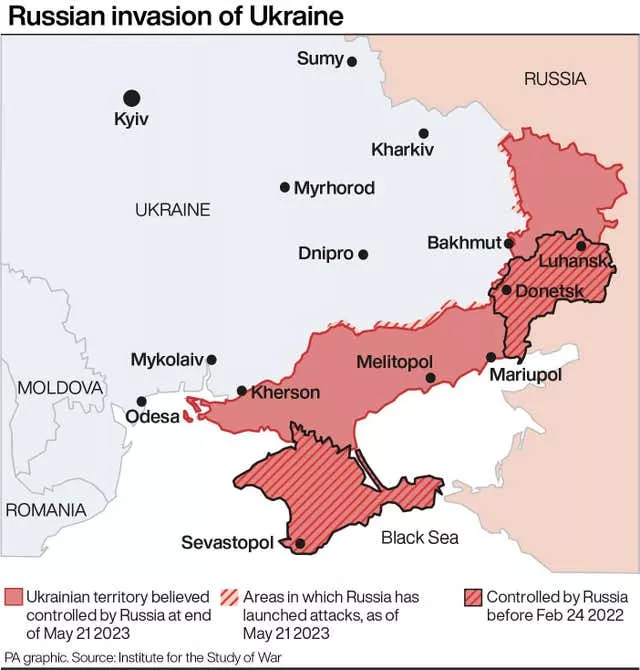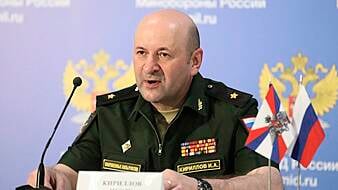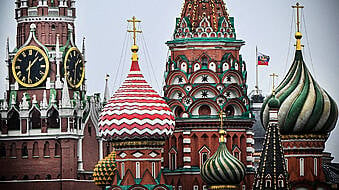Russian private army Wagner lost more than 20,000 fighters in the drawn-out battle for Bakhmut, according to chief Yevgeny Prigozhin.
He said about 20% of the 50,000 Russian prisoners recruited to fight in the 15-month war died in the eastern Ukrainian city.
The figure was in stark contrast with claims from Moscow that it has lost just over 6,000 troops in the war, and is higher than the official estimate of the Soviet losses in the Afghanistan war of 15,000 troops between 1979-89.
Ukraine has not said how many of its soldiers have died since Russia’s full-scale invasion in February 2022.
Analysts believe the nine-month fight for Bakhmut has cost the lives of tens of thousands of soldiers, among them convicts who reportedly received little training before being sent to the front.

Russia’s invasion goal of “demilitarising” Ukraine has backfired because Kyiv’s military has become stronger with the supply of weapons and training by its Western allies, Mr Prigozhin said in an interview published late on Tuesday with Konstantin Dolgov, a pro-Kremlin political strategist.
Mr Prigozhin also said the Kremlin’s forces have killed civilians during the war, something Moscow has repeatedly and vehemently denied.
Mr Prigozhin, a wealthy businessman with links to Russian president Vladimir Putin, is known for his bluster – often spiced with obscenities – and has previously made unverifiable claims, some of which he later backtracked on.
Earlier this month, his spokespeople published a video of him shouting, swearing and pointing at about 30 uniformed bodies lying on the ground, saying they were Wagner fighters who died in a single day.
He claimed the Russian Defence Ministry had starved his men of ammunition and threatened to give up the fight for Bakhmut.
He also said in Tuesday’s interview it was possible that Kyiv’s anticipated counter-offensive in coming weeks, given continued Western support, might push Russian forces out of southern and eastern Ukraine as well as annexed Crimea.
“A pessimistic scenario: the Ukrainians are given missiles, they prepare troops, of course they will continue their offensive, try to counter-attack,” he said.
“They will attack Crimea, they will try to blow up the Crimean bridge (to the Russian mainland), cut off (our) supply lines. Therefore, we need to prepare for a hard war.”
The Ukrainian General Staff said on Wednesday that “heavy fighting” is continuing inside Bakhmut, days after Russia said that it completely captured the devastated city.
Bakhmut lies in Donetsk province, one of four provinces Russia illegally annexed last autumn and only partially controls.
The head of Ukraine’s ground forces, Oleksandr Syrskyi, said that Kyiv’s forces “are continuing their defensive operation” in Bakhmut, and have attained unspecified “successes” on the city’s outskirts.
A Ukrainian commander in Bakhmut told The Associated Press on Tuesday that the Ukrainians have a plan to push the Russians out of all occupied territory.
“But now we don’t need to fight in Bakhmut, we need to surround it from flanks and block it,” Yevhen Mezhevikin said. “Then we should ‘sweep’ it. This is more appropriate, and that’s what we are doing now.”
Meanwhile, Russian forces have shot down “a large number” of drones in the southern Belgorod region, a local official has claimed.

The drones were intercepted overnight over the province, Belgorod governor Vyacheslav Gladkov said in a Telegram post.
He said that no one had been hurt but administrative buildings, residential buildings and cars were damaged.
Russia said the previous day that its forces beat back one of war’s most serious cross-border attacks, with the Defence Ministry saying that more than 70 attackers were killed in a battle in Belgorod that lasted around 24 hours. It made no mention of any Russian casualties.
Russian Defence Ministry spokesman Igor Konashenkov claimed that local troops, air strikes and artillery routed the attackers.
Twelve local civilians were wounded in the attack, officials said, and an older woman died during an evacuation.
Details of the incident in the rural region about 45 miles north of the city of Kharkiv in eastern Ukraine, and far from the front lines of the almost 15-month war, are unclear.

Moscow blamed the incursion that began on Monday on Ukrainian military saboteurs.
Kyiv described it as an uprising against the Kremlin by Russian partisans. It was impossible to reconcile the two versions, to say with certainty who was behind the attack or to ascertain its aims.
The region is a Russian military hub holding fuel and ammunition depots. Moscow officials declined to say how many attackers were involved in the assault or comment on why efforts to put down the attackers took so long.
The Belgorod region, like the neighbouring Bryansk region and other border areas, has witnessed sporadic spill-over violence from the war, which Russia started by invading Ukraine in February 2022.







